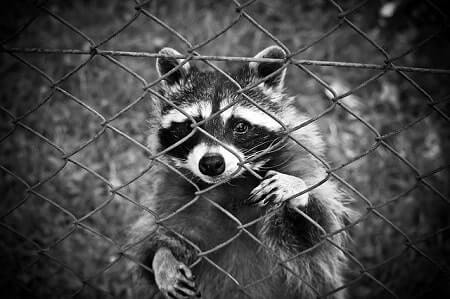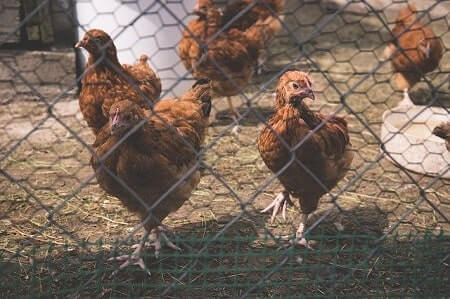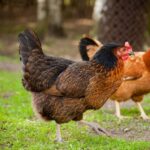Raccoons are nocturnal animals, but that doesn’t mean they will not be active during the day too. They are one of the most dangerous predators to chickens, so if you have raccoons in your area you have to assume they will attack your chickens during the day.
Finding a predator has attacked or killed one or more of your chickens is devastating. It really is.
It’s one of the situations where it really is better to be safe than sorry. Predators are incredibly cunning and wiley, you can’t leave anything to chance.
Here’s what you need to know about protecting your flock against chickens and dangers these stripy animals present:
Table of Contents
How Dangerous Are Raccoons to Chickens?
Raccoons are incredibly dangerous to chickens. In some parts of the country, they are the main threat in the form of a predator and some owners lose a lot of chickens to raccoon attacks.
They have sharp claws and teeth, and what separates them from a lot of other predators is how smart and determined they are.
Raccoons are actually able to open simple latches and doors, and figure out ways to get under, over, or through any gaps in the fencing.
Related - Do owls kill chickens?
What Do Raccoons Do to Chickens?

I will spare you the most gruesome details, but it’s important that you know how and what raccoons do to their prey to help you identify them as the predator responsible for terrorizing your chickens.
Raccoons do not typically remove their prey from the scene to share with the rest of their group. They tend to drag chickens a little ways from their coop and eat them in the open.
If you’ve approached your coop and found the remains of a chicken, it’s likely to have been a raccoon, opossum, or a skunk. All three of these predators tend to feed on their prey where they find them in a frenzy.
While coyotes, hawks, owls, and bobcats tend to remove chickens and retreat somewhere quiet away from the scene where they can either share their prey or eat in peace.
I’ve read a lot of reports from owners that say a raccoon reached through a fence and got a hold of a chicken. Then pulled them so hard that they literally pulled the hen apart through the cage.
That seems to be their MO if they can’t find a way to enter the coop, run, or enclosure.
When Are Raccoons Most Active?
What catches most chicken owners out is that raccoons are typically nocturnal in nature and most active at night.
So, it’s easy to let your guard down and leave your chickens to roam free-range all day assuming they are safe from raccoons.
But a hungry or crafty raccoon will venture out in the day too if they feel the need to. If you know you have coons in your area, you can’t take any chances day or night.
Raccoons will attack chickens during the day.
How Do I Keep Raccoons Away From My Chickens?

There are a few things you can do to raccoon-proof your chickens’ enclosures. As well as putting some deterrents in place to further repel these masked predators.
Here are some of the common measures chicken owners put in place:
Securing Their Coop and Run
The most important consideration is making the areas where your chickens roam, hangout, and sleep secure.
For most people, this means their coop and run. A coop should always be a chicken’s safe haven.
With raccoons, you’ll need to be extra vigilant with the door and how it locks - make sure a small child can’t figure out how to get in and that should do it.
If you have an enclosure for your chickens to roam during the day, you’re going to need wire mesh or fencing with small holes.
I know backyard chicken owners who have had their chickens killed due to a raccoon sticking their paw through the meshing and grabbing a chicken.
Remove All Food Sources
It’s often the smell of food, or at least something that a raccoon's nose thinks is food, that will attract them in the first place.
To be honest, it’s good practice to lock away chicken feed overnight anyway. Chickens don’t need to eat overnight, and it’s only going to attract rodents, insects, or predators.
Also, think about other potential smells that might attract them. You might have some nuts out in a bird feeder, bins nearby, anything like that could alert their sensitive noses to a possible food source.
Deterrents
It doesn’t harm to use some kind of deterrents, too. Especially further out at the perimeters of your yard to try and make them turn the other way before they even start sniffing around the coop.
I’ve read about all kinds of smells that are supposed to deter raccoons; cayenne pepper, ammonia-soaked cloths, there are also some commercial products that claim to work.
I’ve found scents to be hit or miss with various animals over the years, so I’m never sold until I try one.
A more sure bet is to set traps. It might sound drastic to some, but if your chickens are in danger, having a pest control team set some traps to remove the raccoons from your area is a worthwhile consideration.
In Summary
There is nothing more frustrating than having to wage war against a predator to keep your chickens safe. I’ve been there, it’s a stressful, time-consuming, and costly process.
But you have to take it seriously. Especially raccoons.
Raccoons will attack chickens during the day if they see an opportunity. Just as they will overnight too if they can get access to your chooks.
If it means turning their coop into a mini Fort Knox and their run into an impenetrable safe haven, that’s what you’re going to have to do.
Hopefully, the tips in this article have helped you feel more at ease. It’s not that hard to keep one step ahead of predators and keeping your chickens safe.
Resources
Image credits - Images by Alexas_Fotos, MichaelGaida, and StockSnap, from Pixabay
Raccoon Intelligence - apa.org




